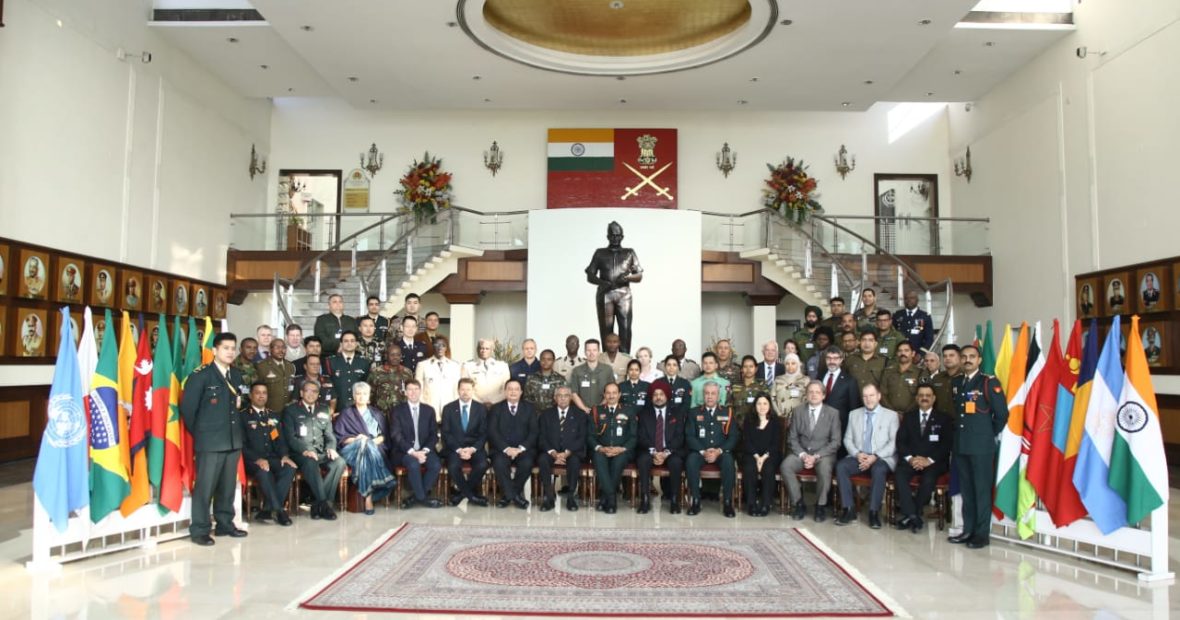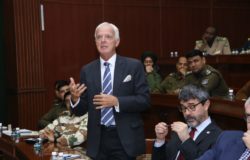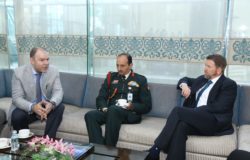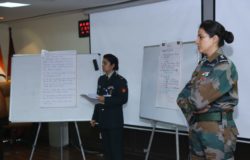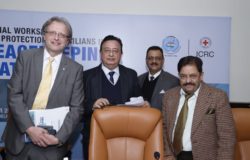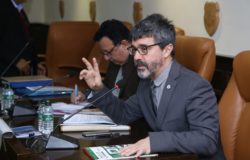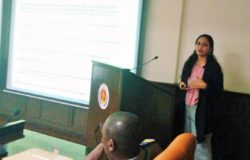The International Committee of the Red Cross (ICRC) in partnership with the Centre for United Nations Peacekeeping (CUNPK), organised an international workshop, ‘Integrated Protection of Civilians in UN Peacekeeping Operations’ 17-21 December in New Delhi.
The workshop that attracted army officers from 23 countries, focussed on various aspects of International Humanitarian Law (IHL), protection of civilians, Conflict-Related Sexual Violence (CRSV) and child protection issues during international peacekeeping operations. In his welcome address, Lt Gen Saranjeet Singh, YSM, DG SD Indian Army welcomed the army officers and hoped that the training programme will add to their experience and enhance their peacekeeping capabilities.

Lt Gen Saranjeet Singh of the Indian Army welcomed the officers and hoped that the training will enhance their peacekeeping capabilities.
Jeremy England, Head of Regional Delegation, ICRC, said in his opening remarks that the constantly changing nature of international conflict is throwing up new challenges to peacekeeping. He added that despite the difficulties, the peacekeepers are mandated to follow the norms of IHL. He lauded India’s role in peacekeeping and said: “India is one of the top three nations that is contributing troops, including women peacekeepers, to international operations.” Highlighting the importance of such operations, Mr England said nearly 300,000 child soldiers are forced into slavery, sexual work and actual combat, instead of being sent to school for education.

Jeremy England, Head of Regional Delegation, ICRC, said that the constantly changing nature of international conflict is throwing up new challenges to peacekeeping.
Lt Gen IS Ghuman, AVSM, DCDAS (IS&T), Indian Army, in his inaugural address said that the world is likely to see more wars and conflicts in the coming years. He highlighted that the peacekeepers face an uphill task due to harsh conditions, difficult terrain and the absence of local support. “It is difficult to figure out who is a civilian and who is a combatant. The use of human shield during such conflicts is always a challenge.”

Lt Gen IS Ghuman of the Indian Army said that peacekeepers face an uphill task due to harsh conditions, difficult terrain and the absence of local support.
Expanding on the need to protect civilians, Pierre Gentile, Head of Protection Division, ICRC, said that protection of civilians is not just the role of the peacekeeping forces, “…it is everyone’s concern – political parties, military forces, the police, judicial powers, civil society actors and humanitarian actors, all of them have a role to play.”
An entire day was dedicated to Conflict-related Sexual Violence (CRSV) where the panellists repeatedly underlined the fact that CRSV leads to long lasting suffering like physical problems, psychological trauma and socio-economic difficulties for the affected communities. Lt Col Aparna Bisen of the Indian Army, said that it is important for peacekeepers to keep in mind vulnerable groups and they should learn to make a distinction between victims and perpetrators.
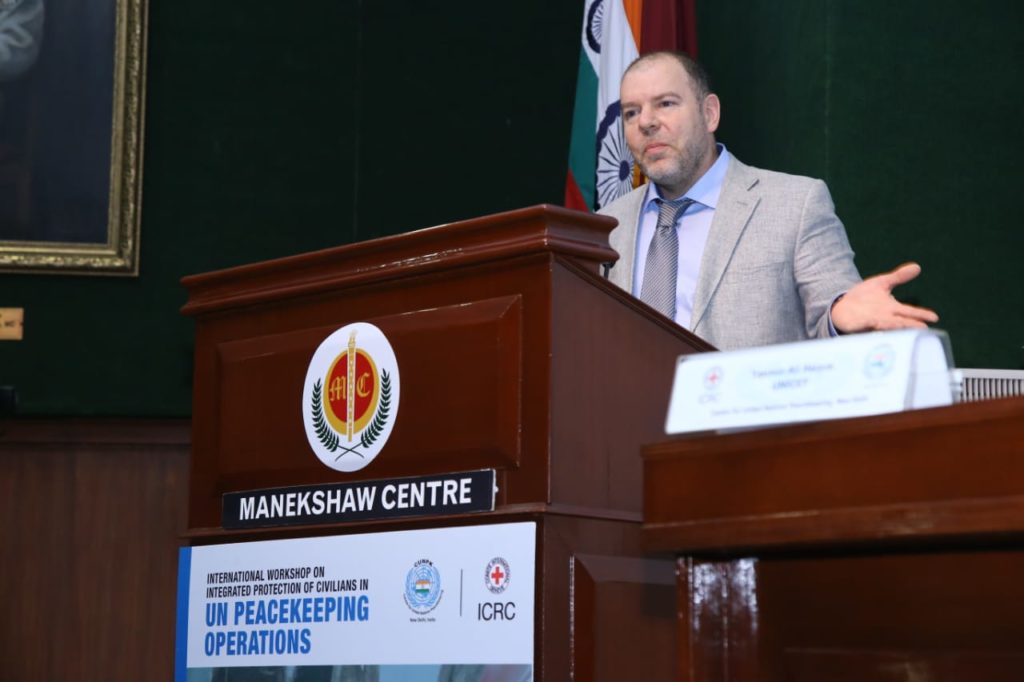
Pierre Gentile, Head of Protection Division, ICRC, said that protection of civilians is everyone’s concern – political parties, military forces, police, judicial powers, civil society actors and humanitarian actors.
Narrating the trauma of a victim of sexual assualt, Gentile said that they are invisible because such people do not report crimes of a sexual nature. “In the case of male victims, the chances of reporting a sexual crime are even lesser as the norms of masculinity are questioned. But IHL applies to all equally. It protects men and boys against sexual violence in armed conflict,” Gentile said.
In the sessions on Child Protection, the trainers pointed out that it is children, women and elders who suffer the most in an armed conflict. Lt Col Manoj Kumar of the Indian Army said that if the peacekeeping forces understand the situation in their area, they can work with the local community and the government to improve conditions for children. He added: “Children are protected by special rights. Besides IHL, there are global treaties related to child protection.” He reminded the delegates that child labour, sexual exploitation and abuse of children falls under zero tolerance.”
Supriya Rao, Legal Adviser, ICRC New Delhi gave an overview of provisions of the International Law and IHL that apply to peacekeeping forces on duty. Highlighting the conditions under which children join an armed conflict, she said: “One of the main reasons that children join an armed conflict is to ensure their own survival. Therefore they are looked upon as victims not as perpetrators.” She added that ICRC has been trying to raise awareness on the importance of education in regions of armed conflict with the concerned parties.
Brigadier A. Sengupta of the Indian Army spoke about the challenges that peacekeepers have to face in situations of armed conflict and thanked ICRC for mentoring and sharing its vast international experiences.
Yves Heller, Deputy Head of Regional Delegation, ICRC, said that the workshop underscores the dilemmas and challenges involved in peacekeeping and the growing need to protect civilian populations during armed conflicts and other situations of violence. Stressing upon the importance of various global laws, he added that as international peacekeepers may have to use force in certain situations, they must be fully aware of the legal framework that is applicable to protect civilians under the norms of IHL or of international human rights and that is a learning that this seminar seeks to emphasise.
Check out photographs from the ICRC-CUNPK peacekeeping workshop:


